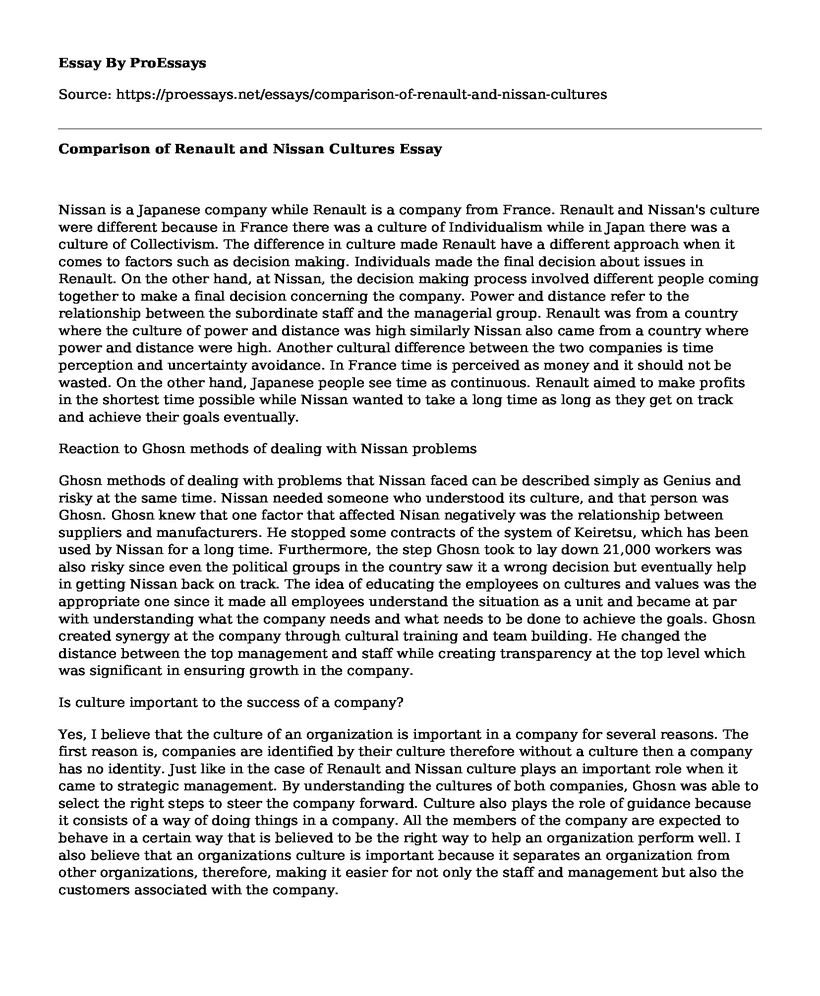Nissan is a Japanese company while Renault is a company from France. Renault and Nissan's culture were different because in France there was a culture of Individualism while in Japan there was a culture of Collectivism. The difference in culture made Renault have a different approach when it comes to factors such as decision making. Individuals made the final decision about issues in Renault. On the other hand, at Nissan, the decision making process involved different people coming together to make a final decision concerning the company. Power and distance refer to the relationship between the subordinate staff and the managerial group. Renault was from a country where the culture of power and distance was high similarly Nissan also came from a country where power and distance were high. Another cultural difference between the two companies is time perception and uncertainty avoidance. In France time is perceived as money and it should not be wasted. On the other hand, Japanese people see time as continuous. Renault aimed to make profits in the shortest time possible while Nissan wanted to take a long time as long as they get on track and achieve their goals eventually.
Reaction to Ghosn methods of dealing with Nissan problems
Ghosn methods of dealing with problems that Nissan faced can be described simply as Genius and risky at the same time. Nissan needed someone who understood its culture, and that person was Ghosn. Ghosn knew that one factor that affected Nisan negatively was the relationship between suppliers and manufacturers. He stopped some contracts of the system of Keiretsu, which has been used by Nissan for a long time. Furthermore, the step Ghosn took to lay down 21,000 workers was also risky since even the political groups in the country saw it a wrong decision but eventually help in getting Nissan back on track. The idea of educating the employees on cultures and values was the appropriate one since it made all employees understand the situation as a unit and became at par with understanding what the company needs and what needs to be done to achieve the goals. Ghosn created synergy at the company through cultural training and team building. He changed the distance between the top management and staff while creating transparency at the top level which was significant in ensuring growth in the company.
Is culture important to the success of a company?
Yes, I believe that the culture of an organization is important in a company for several reasons. The first reason is, companies are identified by their culture therefore without a culture then a company has no identity. Just like in the case of Renault and Nissan culture plays an important role when it came to strategic management. By understanding the cultures of both companies, Ghosn was able to select the right steps to steer the company forward. Culture also plays the role of guidance because it consists of a way of doing things in a company. All the members of the company are expected to behave in a certain way that is believed to be the right way to help an organization perform well. I also believe that an organizations culture is important because it separates an organization from other organizations, therefore, making it easier for not only the staff and management but also the customers associated with the company.
Cite this page
Comparison of Renault and Nissan Cultures. (2021, Mar 01). Retrieved from https://proessays.net/essays/comparison-of-renault-and-nissan-cultures
If you are the original author of this essay and no longer wish to have it published on the ProEssays website, please click below to request its removal:
- Market Coordination and Beef Essay
- Delivering Negative News Essay
- Brand Is Power Essay Example
- Compare and Contrast Essay on 2018 Toyota Land Cruiser and 2018 Land Rover Range Rover Sport
- Salary Gap for Females in the Media Industry Essay Example
- How Big Data Uses Microeconomic Principles to Affect the Market - Essay Sample
- Essay Example on Cultural Individualism in the USA and Kenya: A Comparison







